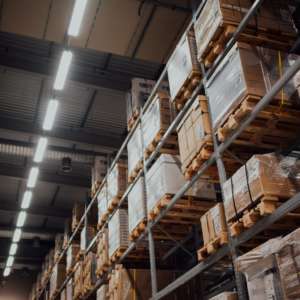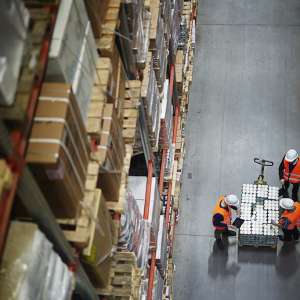Understanding what makes a business successful on the outside seems simple enough: find products and services people love and figure out how to get them to those excited customers. But for those who’ve tried to run a business before, there’s a lot of complexity going on behind the scenes as you answer the former (with marketing) and the latter (with logistics).
Managing one’s own logistics processes from top to bottom is a monumental task that even massive companies like Amazon grapple with. It wasn’t until 2019 – 25 years since Amazon’s founding – that it launched Amazon Freight, shifting away from third-party partners to focus on growing its own infrastructure. If it has taken so long for a company like Amazon to handle its own shipping and freight, how do small businesses do it?
Unless you’re operating in a very small market (that is, your town or, maximally, your county) and your orders don’t overwhelm who’s driving the sprinter van to make deliveries, the task may be bearable. But what if you want to ship across the state, the country, or even over international borders? What if you don’t have the capital, time, or – frankly – the energy to run deliveries or own a warehouse, especially if you’re a one-person business building your eCommerce brand from the ground up?
Enter third-party logistics services (or 3PL), a boon in more ways than just dollars, cents, and mileage. In this article, we’ll explore 3PL, how it’s used, and how to choose the right logistics partner for your business.
What is 3PL?
Trying to vertically integrate your entire logistics process is a gigantic investment. Just because you own a store – whether online or in the traditional brick-and-mortar sense – doesn’t mean you need your own fleet of delivery trucks, warehouses, software, and employees to manage it all.
There are plenty of freight, warehousing, and fulfillment companies that are happy to do the heavy lifting. While some specialize in one part of the logistics process, others might specialize in serving an industry or niche.
Regardless of these companies’ business models, they all operate under the umbrella of third-party logistics. Some names you may be familiar with are UPS, FedEx, and DHL. Even the United States Postal Service operates as a 3PL entity, shipping merchandise all over America on behalf of other businesses – including, for quite some time, Amazon.
So how do you, the enterprising business owner, make use of 3PL?
How Can 3PL Be Used?
3PL has a wide range of applications, though these are a few of the most common use cases:
Scaling Your eCommerce Business
An entrepreneur wants to set up a new clothing store online. They already have a platform to sell their merchandise and a means to make the merchandise, but they don’t have the space to store it at scale or the resources to deliver it themselves.
Instead, they choose to partner with a fulfillment company, sending the merchandise to be stored in the partner’s warehouse. When new orders are made, the fulfillment company picks, packs, and ships on behalf of the clothing store.
Saving Money on International Shipping
A Canadian company wants to enter the American market but wants to save money shipping across the border. Instead of shipping to American customers directly from their Canadian warehouses, they opt to store some of their merchandise at a 3PL warehouse within the US.
This avoids extra customs fees by minimizing shipments crossing the border (one bulk order to the warehouse rather than many individual orders to customers) as well as any extra fees due to returns (returns from American customers go to the American warehouse, avoiding the border entirely). Having a state-side warehouse also shortens shipping times and costs for the customer for the same reason.
Extending Domestic Reach
A successful brick-and-mortar retailer is outgrowing its local market and wants to start shipping to the surrounding states. While the three sprinter vans it owns have done wonders for serving the local counties, trying to send individual deliveries beyond the first 15 miles has been a nightmare.
The retailer then partners with a 3PL delivery company that operates on a national scale, leveraging their vehicles, warehouses, and delivery routes to serve the retailer’s customers without delay. Since the delivery company already has established routes, adding the retailer’s deliveries to them isn’t as big of an impact on them as it would be for the retailer to try and send its vans out beyond its main market.
Considerations When Choosing a 3PL Partner
While 3PL encompasses various logistics services like fulfillment warehousing, transloading, freight brokerage, freight management, and other value-added services, no two 3PL companies are alike. Some focus on one element of the logistics process, whereas others are full-service within a specific industry or niche such as agriculture, manufacturing, or eCommerce.
When shopping for a third-party logistics partner, be sure to consider the following factors before making your choice:
Labor and Service Costs
It’s true that going with a 3PL company can save you a lot of time and money. After all, you’re delegating logistics to the experts so that you can focus on building your business. But this still costs money and, depending on your scale, may end up being more costly than what it’s worth.
For instance, if you serve your local market – let’s say all your customers are within 5 miles of your store – and you’re able to keep up with deliveries, working with a 3PL company might save you time, but if you’re not reinvesting that time in profitable ways, the cost of the 3PL’s services might cause more problems than not.
However, if your company or its market is growing faster than you can keep up to the point you’re losing out on tons of potential customers, a 3PL partner is great for extending your logistics network. Finding one that can also scale with you and any seasonality your business may have is crucial to remain cost-effective.
Technology Integration
Some 3PL companies are on the cutting edge of technology, using the best software and tools available to the industry. While this is great for order accuracy, tracking, and time- and cost-efficiency, it can become overwhelming if your business doesn’t have a true need for it or there’s resistance to learning new processes. Technology is fantastic when used correctly, but retraining staff is costly, especially if they prefer how things have always been done.
While this may represent a temporary setback, it’s important to consider the time and resistance it would take to integrate new technology into your business’s processes. If there are any slow periods, those would be better than, say, in the middle of the holiday season when things are already stressful enough as they are.
Provider Experience
When it comes to delegating any work to a third party, experience is everything. After all, you’re hiring professionals to cover a skill or service gap you and your team can’t already fill. With that in mind, you want to do your research and find companies that have been doing what they’re good at for a while now rather than relying on a partner that might not know much more than you.
Moreover, because logistics underpins everything, well-seasoned providers have sizeable networks of other companies, professionals, and industry experts to lean on. By partnering with industry veterans, you also get the benefit of leveraging their wide reach, something brand-new companies often lack.
Specialization
Similar to experience, it’s important to keep in mind any specializations a 3PL company may have – and, doubly important, that they match what you need. For example, if you’re selling t-shirts, working with a company that specializes in transloading agricultural products wouldn’t be as effective as one that specializes in online retailing. While there are plenty of 3PL companies that might not actively specialize in a single industry or service, do your research and look for companies that check as many of your logistics boxes as possible.
Explore Third-Party Logistics Solutions with UCanTrade
Making sure that your merchandise gets to where it needs to be in a timely, affordable manner is crucial to success. With rising costs, sticky inflation, and a reprioritization of everything from international trade to same-day delivery expectations, the world of logistics can be a chaotic place. Luckily, you don’t need to go it alone.
At UCanTrade, we specialize not just in supporting Canadian businesses exporting into the United States, but helping American businesses grow their logistics networks domestically. In turn, we help everyone we work with find the most effective solutions to their logistics challenges. If you’re looking for help broadening your horizons, reach out to our knowledgeable experts today to learn more.



